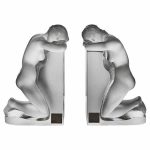Pearls Are Back — Kovels Top Buying Tips
What To Look For When Buying Vintage Pearls
There’s a watery trend afoot. Pearls, once a common fashion statement, are back! Short and long strings of the gorgeous gift from the sea, as well as stud earrings and even pearl engagement rings, are everywhere … for both men and women. The natural gems were long popular and a symbol of success. Think Audrey Hepburn or Grace Kelly. And for centuries, royalty had an affinity for them.
Stars seen sporting pearl necklaces include Shawn Mendes, the Jonas Brothers, Usher and Harry Styles. The renewed allure is not completely Retro in style. Graduated pearls are out; long strands are in. If you want to be in-the-know about pearls, here is some basic information before you head out to your favorite antiques store to find a strand or two for upcoming holiday parties:
Natural pearls: Created in certain types of oysters with no human help
Cultured pearls: Technicians implant a small section of shell along with mantle tissue from similar mollusks into an oyster. They are returned to the ocean in individual mesh pockets and left to secrete layer after layer of glossy material that forms the pearl. The oysters are periodically brought onto land for cleaning and a health assessment. Pearl technicians take every conceivable measure to protect the oysters from disease and damage.
Freshwater pearls: Grown inside freshwater mussels as opposed to ocean mollusks. They are the most affordable and common kind on the market. They can be peach, lavender, pink, yellow and white colored. Freshwater pearls dyed black are known as “Peacock pearls.”
Tahitian pearls: Harvested from black-lipped oysters in the coastal waters of French Polynesia. They are known for being the only naturally occurring “black pearls,” with glossy metallic grey coloring.
South Sea pearls: These are typically the largest and most expensive variety of pearl. They are grown in the infamous “coral triangle” between Australia, Indonesia and the Philippines.
Baroque pearls: All pearls fall into two categories, traditional and baroque. Traditional pearls are round. Baroque pearls are all types of mishaped pearls.
Real vs. fake pearls:
- Real pearls are cold to touch for the first couple of seconds before warming. Fake ones are room temperature.
- Fake pearls are perfect and identical in terms of shape, size, color and surface characteristics. Real pearls are rarely round.
- Fake pearls are all the same color.
- Majorca pearls are a type of fake pearl with a glass bead in the center.
- Both natural and cultured pearls have textured surface. When you rub the pearls lightly against each other or on your front teeth, they feel gritty. Fake or imitation pearls feel smooth or glassy.
- Real pearls are heavier than the fakes.
- The drill holes in real pearls are usually very small.

Majorca fake pearl necklace

Gray baroque pearls

Strand of graduated cultured pearls

Black pearls, natural color

Butterfly pin, pearl with natural baroque shape

Ring with half pearl



Leave a Reply
You must be logged in to post a comment.